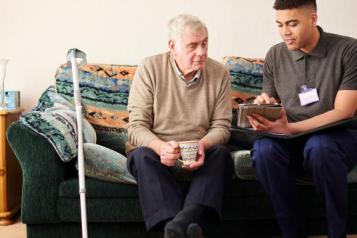An ideal care assessment for domiciliary care

The process to obtain care in your own home is extremely complex and lengthy.
First of all you have to have an allocated social worker. To obtain one you need to contact My Choice in Telford on 01952 459252. If you already have an allocated social worker you need to let them know that you wish to change care company and there are three telephone numbers for this in Telford – 01952 387183/385577/385465.
Once you have an allocated social worker you need to agree your care needs with them. This should be carried out and be patient centred and not “budget centred.
Once needs are agreed the social worker should contact the procurement officer at the local authority and they should look at the best domicilary care provider to meet your care needs. You should then receive a telephone call from the procurement officer who informs you which domicilary care company is going to provide the care to meet your care needs.
The domicilary care company should then contact you and do a quick risk assessment over the telephone e.g. has a client got a pet, e.g. cat or dog as some care workers may be allergic to pets and the company needs to protect care workers as well as provide the care for the client with care needs. An appointment is then made for the care company to meet the client prior to the care calls commencing.
The details that the care assessment should cover are:
- Does the client have mobility issues? If so how do they manage in and out of the home. It may be that the client can manage in the home with aids and outside the home may require the use of a manual/electric wheelchair etc.
- Does the client have a key-safe box? If they do the care company will need the code to access the key safe. Also, the care company may contact the emergency services with this code should they ever need to gain access.
- Is the client allergic to anything? If so these should be detailed in the care assessment.
- Is the client on any medication and do they need assistance taking this medication at home? If they do a medicines chart is required to be filled in by a care worker each time medication is given detailing how much and date and time it is given.
- Does the client have a specific way of making care workers to feel relaxed when dealing with the client e.g. a mastectomy patient may wish to talk to care workers to reassure them of what they are dealing with rather than assume they know everything about a specific medical condition. A client may need to let care workers know they that cannot move joints in a certain position otherwise it can cause damage or pain to the client. This should be discussed at the initial care assessment.
Having strangers in a personal home setting can be unnerving for both the care worker and the client and to help make this situation less intimidating can be helpful to both parties.
Some care companies have an emergency contact sheet which is placed in the client’s care documentation, this can be handed to any emergency service should they require it to understand the client’s particular care requirements. This usually has details of any medication (if any), contact number for GP and details of next of kin or emergency contact number if the client lives alone.
Some care companies will also have a monthly care record detailing times of call visits, what the client required at that visit and if an emergency arose what action was taken. The care workers should take these into the care company’s office as soon as possible at the end of each calendar month.
Some care companies also have a questionnaire at the back of the monthly care record asking clients to complete these so that they can give feedback on the care they have received and what they would like to be improved.
As part of the care assessment the care company should explain the complaints procedure to clients so that should an issue arise they know how to complain or if an issue arises out of hours how to contact the company and keep them informed of any changes e.g. a client being admitted to hospital or going to Accident and Emergency and not being at home when a care call is due to take place.
The care assessment should also include whether the client prefers to be called by their full name or any other name.
The personalisation of the care assessment is very important to both the client and the care company.
Care companies should not be critical or judgemental about the client’s situation and should work in partnership with the client to keep them as independent as possible in their own homes.
A care assessment is for both parties to agree what is required and at what times the care calls are to be made. A care plan should be flexible to meet the client’s needs.
At the end of the care assessment the name of the care worker assigned to the client should be noted down and given to the client along with contact details of the allocated care co-ordinator. This enables the client to contact the company if they have any questions or issues they forgot to ask at the care assessment. It may be useful for a client to request an independent person to attend the care assessment so that they do not forget to ask questions and obtain relevant information to their care needs.
By Fiona Stevenson

